Choosing the best eCommerce platform can make or break your online business in 2025.
With countless eCommerce solutions available, from no-code builders to advanced enterprise tools, it’s more challenging than ever to pick the right one.
After testing 20+ eCommerce platforms and supporting 100+ online businesses across industries, we have distilled the key insights you need to choose the best e commerce platform for your specific growth path.
Startups need agility, established brands need scale, but all sellers need speed, reliability, and features that convert.
In this review, we have ranked the best e commerce platforms based on usability, pricing, integrations, and growth potential.
Let’s explore the most trusted, high-performing ecommerce platforms to power your success in 2025 and beyond.
How We Evaluated These eCommerce Platforms
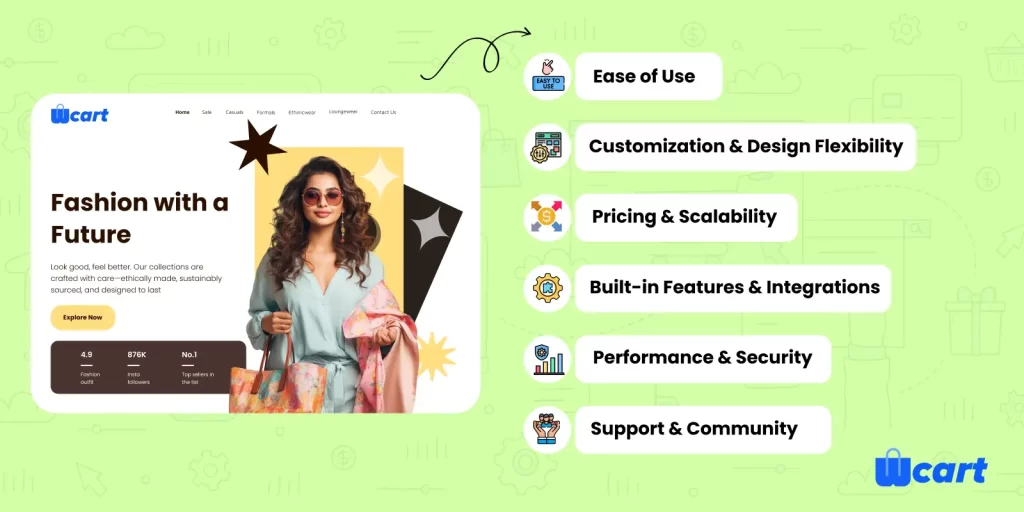
With hundreds of ecommerce solutions available today, not all platforms are built to meet real-world business needs.
Our evaluation process was designed to cut through marketing noise and highlight the ecommerce platforms best suited for functionality, growth, and ROI.
Our team analyzed and tested over 20 platforms using real business scenarios, from startups launching single-product stores to enterprises managing global catalogs.
We rated each solution based on the following key criteria:
1. Ease of Use
From setup to store management, how intuitive is the platform for non-technical users?
2. Customization & Design Flexibility
How well can businesses create branded, conversion-friendly storefronts?
3. Pricing & Scalability
Do pricing tiers support different business sizes, and how cost-effective is the platform as you grow?
4. Built-in Features & Integrations
Are essential tools (SEO, analytics, inventory, shipping, marketing) included or easily integrated?
5. Performance & Security
Speed, uptime, and PCI compliance, how reliably does the platform perform under real traffic?
6. Support & Community
Access to customer support, developer resources, tutorials, and active user communities.
Each platform was given a weighted score to reflect how it serves different types of ecommerce businesses, from new sellers to enterprise operations.
Our goal: To present the best e commerce platforms backed by evidence, not opinion
The Best eCommerce Platforms at a Glance
| Platform | Best For | Ease of Use | Key Features | Starting Price | Scalability |
| Wcart | New launches, growing businesses & multi-vendor marketplaces | Beginner | Easy drag and drop builder, multi-vendor support, headless ready, API integrations, flexible themes | Starts at $30/mo | High |
| Shopify | All-around use (SMBs to enterprise) | Beginner | Drag & drop builder, app store, POS, SEO tools | $39/mo | High |
| BigCommerce | Fast-growing mid-size stores | Intermediate | Multichannel, B2B features, headless-ready | $39/mo | High |
| Wix eCommerce | Small businesses & creatives | Beginner | Templates, simple UI, built-in marketing | $27/mo | Low |
| Squarespace | Visual brands & portfolios | Beginner | Design-focused, digital products, subscriptions | $23/mo | Low |
| WooCommerce | WordPress users & developers | Advanced | Open source, plugins, full control | Free (hosting required) | Medium |
| Ecwid | Adding store to existing site | Intermediate | Plug-in store, easy setup, multichannel | Free (limited) | Medium |
| Shift4Shop | Budget-conscious businesses | Intermediate | Free plan, basic tools, limited UX | $0 (for U.S. merchants) | Low |
| OpenCart | Tech-savvy users | Advanced | Free, flexible, self-hosted | Free (hosting required) | Medium |
1. Wcart
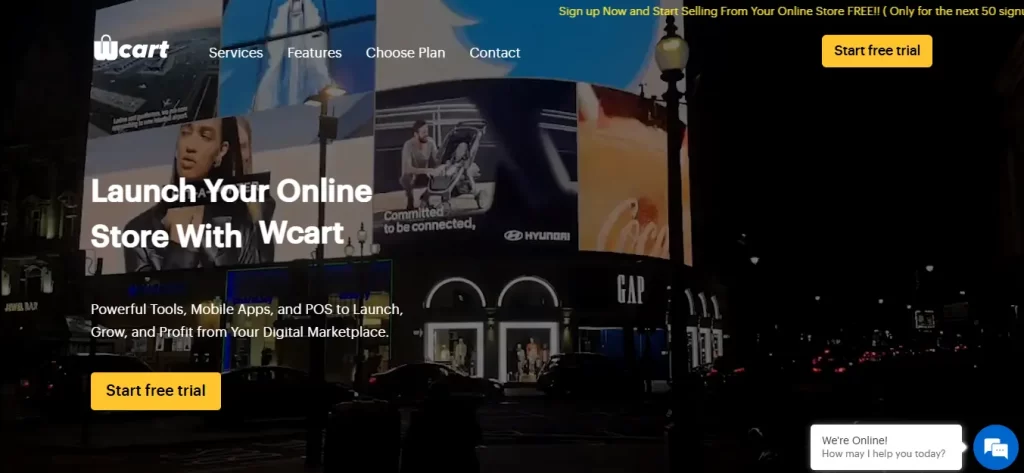
Wcart is a versatile ecommerce platform built for entrepreneurs who want more than just an online store.
Designed to support both single-seller websites and multi-vendor marketplaces, it provides the flexibility, performance, and control needed to grow a modern ecommerce business.
Wcart stands out for its emphasis on future-proof architecture.
Unlike traditional platforms, it supports headless commerce and modular scalability, making it ideal for businesses that expect to grow or customize their tech stack.
It’s especially well-suited for those exploring niche marketplaces, D2C models, or vendor-driven platforms.
Ease of Use
With a clean admin panel and user-friendly builder, it allows both beginners and experienced users to manage products, vendors, and storefronts easily, no coding required.
Key Features
- Built-in multi-vendor capabilities with vendor dashboards
- Headless architecture support using EJS and Node
- Platform is fully customizable to match your brand needs
- Integrates with 100+ global and local payment gateways
- In-built POS module for seamless in-store and online selling
- Drag-and-drop storefront builder with real-time editing
- Spin-to-win sales module and purchase-based couponing to boost conversions
- In-built tools for SEO, abandoned cart recovery, and email campaigns
- Integrations for shipping, payments, and tax handling
- White-labeling and custom branding options
Pricing
Wcart offers a 14-day free trial with no credit card required, giving users full access to test features before subscribing. Paid plans start at $29/month(when billed annually), with flexible tiers based on business size and vendor count, making it cost-effective for startups and scalable for growing brands.
Scalability
It is designed for high scalability, supporting both startup stores and large marketplaces with thousands of vendors.
Support & Community
Users get access to 24/7 expert support, detailed documentation, onboarding assistance, and dedicated migration help. It also maintains an active community forum and knowledge base.
Why Choose Wcart?
Wcart is built for entrepreneurs who need to launch a site quickly, while also addressing the evolving needs of multi-vendor marketplaces. It offers the flexibility of headless commerce combined with easy-to-use tools, making it a strong choice for businesses looking to grow without being limited by platform constraints.
2. Shopify

Shopify is one of the most popular ecommerce platforms globally, offering an all-in-one solution to launch, manage, and grow an online store.
With its hosted infrastructure, user-friendly tools, and vast app ecosystem, it caters to everyone from solopreneurs to large-scale brands.
It stands out for its simplicity and reliability. It’s often recommended for first-time store owners due to its quick setup, clean themes, and strong community support.
Its built-in payment system and seamless integration with marketing tools make it a go-to for fast launches and steady scaling.
Ease of Use
Its drag-and-drop builder and intuitive dashboard make it easy for non-technical users to design and manage their store with minimal learning curve.
Key Features
- 100+ professionally designed store themes
- Built-in Shopify Payments and 100+ third-party payment gateways
- Social selling and marketplace integrations (Instagram, Facebook, Amazon)
- Shopify POS for in-person retail
- Abandoned cart recovery and SEO tools
- Extensive third-party app store
Pricing
Shopify offers a 3-day free trial, followed by a promotional offer of $1/month for the first 3 months. Standard plans begin at $29/month (when billed annually), with pricing tiers for advanced features and enterprise-grade support.
Scalability
It supports medium to high scalability, making it suitable for growing businesses and high-traffic stores alike.
Support & Community
They provide 24/7 support via chat, phone, and email. The platform also features rich documentation, tutorials, and a vibrant community forum for peer-to-peer help.
3. BigCommerce
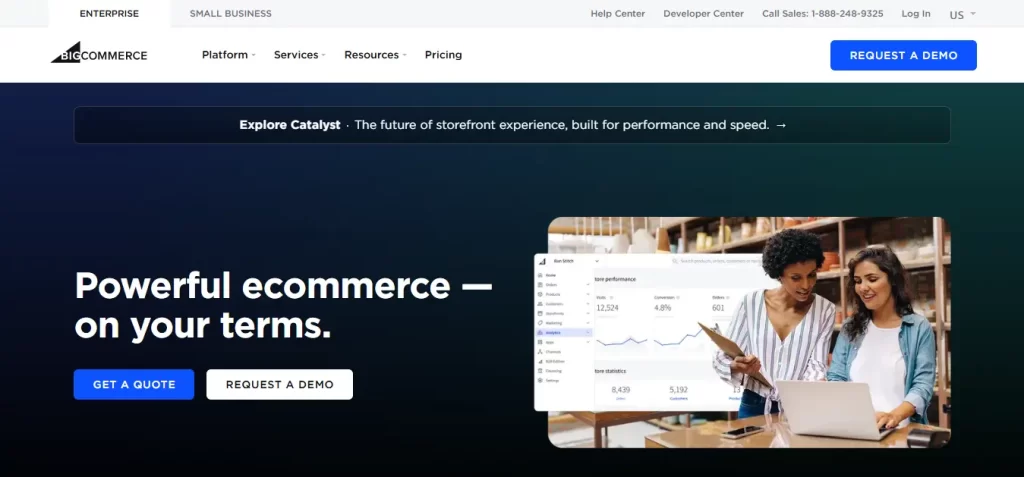
BigCommerce is a powerful SaaS ecommerce platform tailored for businesses with large inventories, B2B requirements, or more advanced selling strategies.
With native support for multi-channel commerce and a flexible API framework, it’s a solid choice for brands needing both simplicity and backend depth.
BigCommerce is often recommended for businesses that outgrow beginner platforms.
It strikes a balance between ease of use and technical flexibility, making it ideal for merchants who want more out-of-the-box enterprise features like custom product rules, multi-storefronts, or complex pricing structures.
While not as beginner-friendly as Wcart or Shopify, BigCommerce offers a well-organized dashboard and onboarding help.
Some technical familiarity is useful for full customization and app integrations.
Key Features
- Native B2B functionality including customer groups, price lists, and quote management
- Supports multi-storefronts from a single admin
- No transaction fees, even with third-party gateways
- 100+ responsive themes, with headless support via APIs
- Seamless integrations with Amazon, Walmart, eBay, and social channels
- Tools for product filtering, faceted search, and inventory syncing
- RESTful APIs for advanced customization and app development
Pricing
BigCommerce offers a 15-day free trial, no credit card required. Paid plans start at $39/month, with pricing increasing based on annual revenue and feature access. The Enterprise plan offers custom quotes for high-volume brands.
Scalability
Built for midsize to enterprise scalability, especially useful for stores with complex catalogs, B2B workflows, or omnichannel setups.
Support & Community
24/7 support is available via live chat, email, and phone. BigCommerce also maintains a large developer community, knowledge base, and a certified partner network.
Read more: How headless commerce works
4. Wix
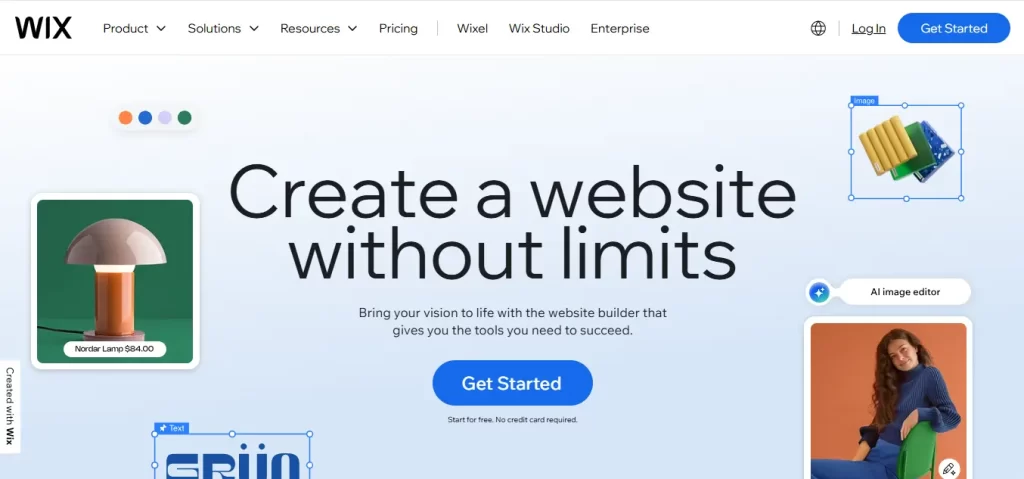
Wix is a user-friendly website builder that includes ecommerce functionality, ideal for individuals and small businesses launching online stores.
Its drag-and-drop design flexibility makes it a go-to for users who want creative control without writing code.
Wix is well-suited for entrepreneurs selling a limited product range or service-based offerings.
It stands out for its design freedom, low barrier to entry, and AI-powered tools that streamline setup.
However, it’s less ideal for large catalogs or businesses expecting complex backend operations.
Ease of Use
With Wix ADI (Artificial Design Intelligence), users can create a store in minutes. The intuitive editor and ready-made templates require no technical skills, making it highly beginner-friendly.
Key Features
- 500+ designer-made templates, optimized for desktop and mobile
- Built-in tools for product listings, inventory, and shipping management
- Integrated Wix Payments, plus support for PayPal and Stripe
- App market for adding reviews, pop-ups, SEO tools, and loyalty programs
- Built-in blogging and email marketing modules
- AI tools for logo creation, site content, and branding
Pricing
Wix offers a 14-day free trial with ecommerce features included. Paid ecommerce plans start at $27/month, with higher-tier plans offering more storage, advanced analytics, and customized branding options.
Scalability
Best for small to mid-sized businesses with simple product lines and creative branding needs. Less suited for complex, high-volume stores.
Support & Community
24/7 customer support, a comprehensive help center, and community forums are available. Wix also features a learning hub for ecommerce best practices and design inspiration.
5. Squarespace

Squarespace is a visually-driven website builder with integrated ecommerce features, best suited for creators, designers, and boutique brands.
It focuses on elegant design, ease of use, and marketing integration, ideal for users who want their store to double as a portfolio or branded experience.
Squarespace is a top choice for solo entrepreneurs, artists, and small businesses looking to blend ecommerce with content-rich experiences like blogs, portfolios, and landing pages.
While its ecommerce features are more limited than platforms like Shopify or Wcart, its sleek templates and brand consistency tools are unmatched in design-centric markets.
Ease of Use
Squarespace offers an intuitive, drag-and-drop editor with beautiful templates that require no code. It’s very beginner-friendly and provides guided setup flows for both website and store.
Key Features:
- 100+ award-winning, mobile-optimized design templates
- Sell physical, digital, and service-based products
- Built-in email marketing, blogging, and social media tools
- Automatic tax calculation, shipping integrations, and inventory control
- Native scheduling system (great for service-based businesses)
- Abandoned cart recovery and customer accounts included in higher plans
- Integrated analytics and SEO tools to grow traffic and engagement
Pricing
Squarespace offers a 14-day free trial, no credit card required. Paid ecommerce plans start at $27/month (Business Plan) and go up to $49/month (Advanced Commerce), depending on features like subscriptions, analytics, and cart recovery.
Scalability
Best for solo creators and small brands focused on design and storytelling. May require switching platforms if scaling into complex ecommerce operations.
Support & Community
24/7 customer support via live chat and email, with an extensive help center and webinars. Active user forums and video tutorials available for self-learning.
Read more: 5 must have features to look in ecommerce website builder
6. WooCommerce
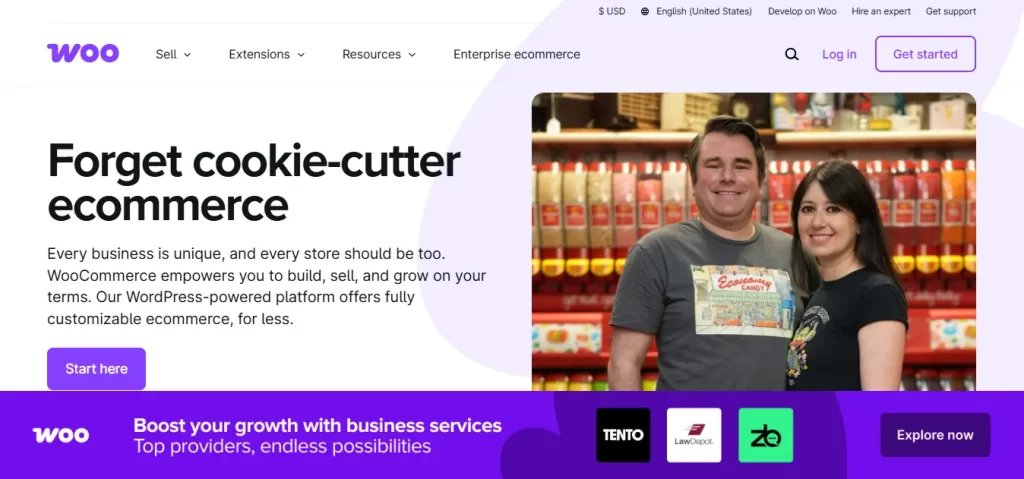
WooCommerce is an open-source ecommerce plugin built for WordPress, offering maximum control and flexibility to sellers comfortable managing their own hosting and site development.
It’s ideal for businesses that want complete customization and already run (or plan to run) a WordPress website.
As a self-hosted solution, WooCommerce appeals to users with web development skills or access to technical resources.
It allows you to shape every element of your store, from the backend structure to frontend design, while integrating with a wide ecosystem of WordPress themes and plugins.
Ease of Use
WooCommerce is beginner-accessible but best leveraged with some technical know-how. Store setup involves installing WordPress, configuring a theme, and managing plugins, which may require developer support.
Key Features
- Seamless integration with any WordPress theme (including 1,000+ ecommerce-optimized themes)
- Fully customizable with PHP, HTML, CSS, and plugin extensions
- Supports digital and physical products, subscriptions, and bookings
- Integrates with 100+ payment gateways, including Stripe, PayPal, and local options
- Native tools for tax calculation, inventory, shipping zones, and coupons
- Extensive plugin ecosystem (SEO, marketing, analytics, etc.) via WordPress
- One-click selling across Facebook, Instagram, Google Shopping, and more
Pricing
WooCommerce itself is free to use, but you’ll incur costs for hosting, SSL, themes, and premium plugins. Budget-conscious users can get started for under $100/year, but scaling businesses often invest more for performance and features.
Scalability
WooCommerce is highly scalable with developer support, especially when paired with managed WordPress hosting or cloud infrastructure.
Support & Community
WooCommerce offers documentation, community forums, and ticket-based support. Since it’s open-source, support is often sourced through hosting providers or freelance developers.
7. Ecwid
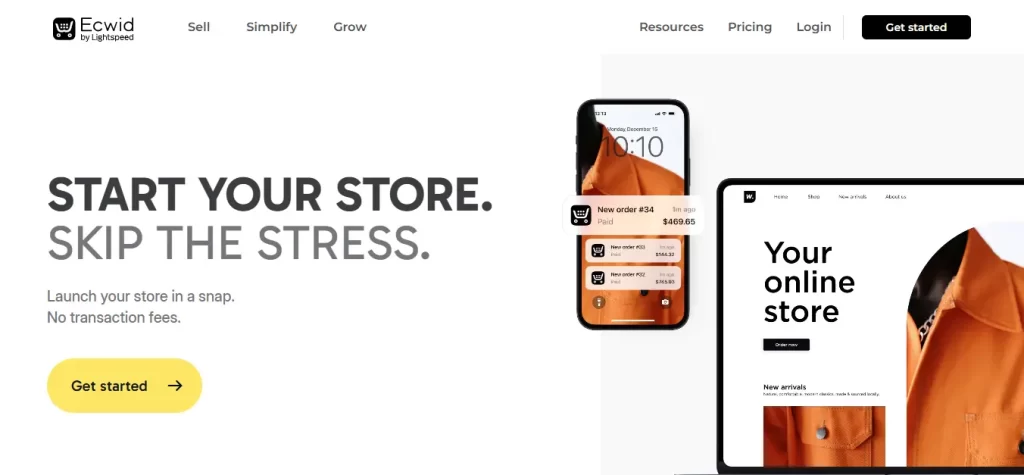
Ecwid (short for “Ecommerce Widget”) is designed to help small businesses quickly add ecommerce functionality to any existing website, blog, or social media page.
It’s ideal for those who already have a digital presence and want to start selling without migrating to a new platform.
Unlike traditional ecommerce platforms, Ecwid works as a plug-and-play solution that integrates with platforms like WordPress, Wix, Weebly, Joomla, and even Facebook or Instagram.
It’s especially useful for businesses wanting to keep their current site and add online selling without a full rebuild.
Ecwid offers a simple backend and step-by-step onboarding wizard. Users can set up products, payments, and shipping within minutes.
It’s especially appealing to non-technical users who want speed and simplicity.
Key Features
- Works with any existing site, just embed your Ecwid store
- Mobile-optimized storefronts with real-time syncing across sales channels
- Sell on Facebook, Instagram, TikTok, Amazon, and more
- Supports 40+ payment options, including Stripe, PayPal, and local methods
- Automatic tax calculation, inventory tracking, and shipping integrations
- Multilingual storefront support for global selling
- Mobile app for managing orders, inventory, and messaging
Pricing
Ecwid offers a forever-free plan for small stores (up to 5 products), and paid plans start at $19/month. The Business Plan ($39/month) includes social selling, discount coupons, and advanced product options.
Scalability
Best for small businesses and side hustlers looking to expand an existing site. Works well for scaling across channels but not ideal for large, complex catalogs.
Support & Community
Ecwid provides live chat, email support, and priority assistance on higher-tier plans. Their help center and video tutorials are detailed and easy to follow.
8. Shift4Shop

Shift4Shop is a powerful, fully hosted ecommerce solution ideal for U.S.-based businesses that want enterprise-grade features for free.
While not as beginner-friendly as Shopify or Wcart, it offers a comprehensive set of tools at no upfront cost, if you use Shift4 as your payment processor.
Previously known as 3dcart, Shift4Shop has rebranded and now targets small to mid-sized merchants looking for serious ecommerce power without a subscription fee.
Its learning curve is steeper, but the trade-off is extensive customization and built-in functionality that would cost extra elsewhere.
Ease of Use
Shift4Shop has a traditional, form-based admin panel. While powerful, it’s not as modern or intuitive as drag-and-drop editors. It’s more suitable for users who are comfortable with structured configuration and managing details manually.
Key Features
- Unlimited products and bandwidth on free plans
- 100+ mobile-ready themes, some with drag-and-drop editing
- Built-in support for SEO, blogs, CRM, affiliate programs, and loyalty tools
- Real-time shipping integrations with USPS, UPS, FedEx, and more
- 50+ payment gateways, including native Shift4 Payments
- Multi-channel selling via Facebook, Instagram, eBay, and Amazon
- Tools for email marketing, abandoned cart recovery, and coupons
Pricing
U.S. merchants can access the full-featured platform for free by using Shift4 Payments. For non-U.S. users or those who want alternative processors, paid plans start at $29/month.
Scalability
Best for cost-conscious sellers who need powerful tools out-of-the-box and plan to grow with the U.S.-centric payment processing.
Support & Community
24/7 phone, chat, and ticket support is available. The platform also offers video tutorials, community forums, and a detailed knowledge base.
9. OpenCart
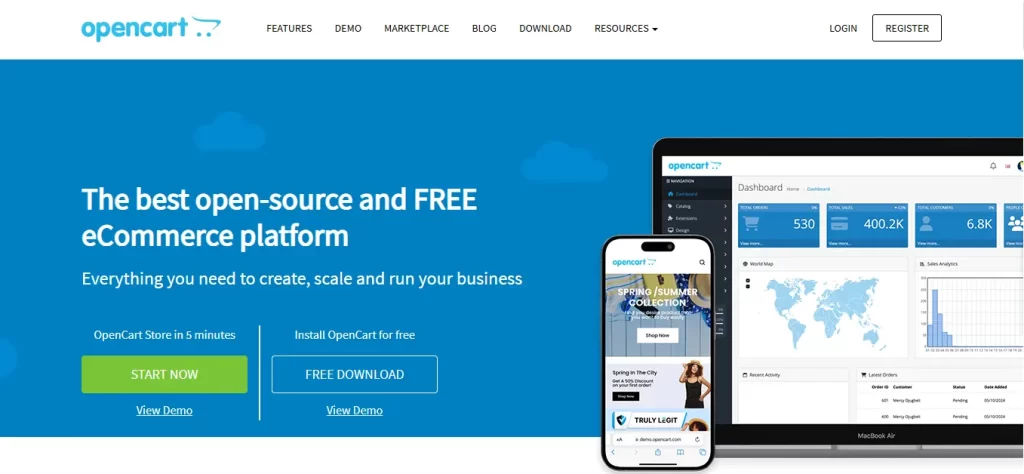
OpenCart is a free, open-source ecommerce platform that gives you full control over your online store.
It’s ideal for developers, tech-savvy entrepreneurs, or businesses with in-house teams who want flexibility without the constraints of proprietary software.
OpenCart is a lightweight yet capable system known for its extensive plugin ecosystem, multi-store functionality, and cost-efficiency.
It’s great if you want to self-host your site and control every aspect of your ecommerce infrastructure, but it requires technical knowledge or developer support to unlock its full potential.
Ease of Use
The admin dashboard is structured and clean, but setup and customization involve manual configurations. Not ideal for beginners, but a solid choice for those with some web development experience or access to technical help.
Key Features
- Completely open-source and free to download and modify
- Supports unlimited products, categories, and users
- Built-in multi-store management and multi-language support
- More than 13,000 extensions available for payments, shipping, SEO, and design
- Integrated reporting, coupon management, and recurring payments
- Developer-friendly architecture for custom module development
- Community-based support plus paid commercial support
Pricing
The platform itself is free. However, you’ll need to factor in costs for hosting, domain, SSL, premium themes, and extensions. Total cost depends on how much custom development you need.
Scalability
Best for developers or businesses that want total flexibility and have the resources to manage technical complexity.
Support & Community
Active community forums, documentation, and a marketplace with both free and paid modules. Paid technical support is available through OpenCart partners or freelancers.
Read more: Latest trends of ecommerce
How to Choose the Best eCommerce Platform for Your Needs
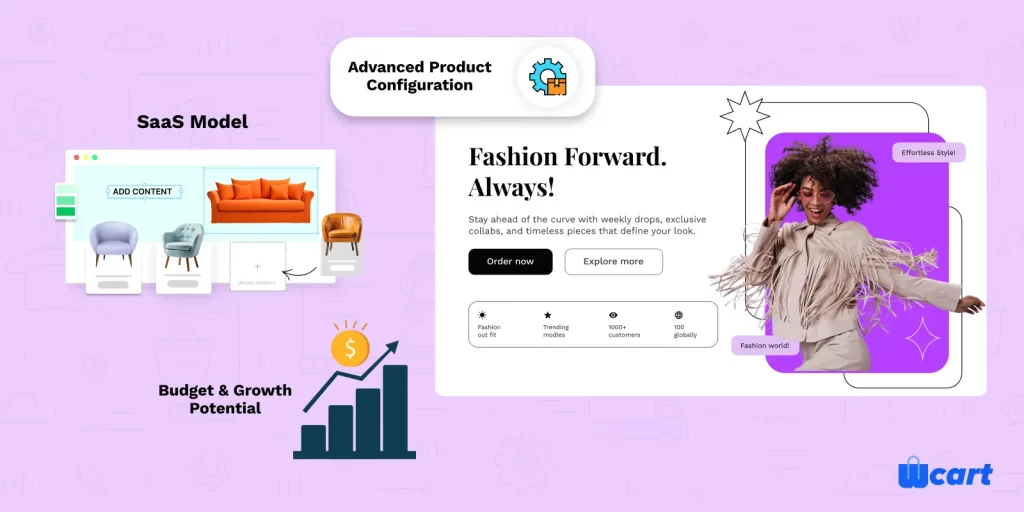
Selecting the right ecommerce platform isn’t just about features, it’s about aligning your tech stack with your business goals, resources, and target audience. Here’s how to narrow down the best fit for your needs.
Self-Hosted vs SaaS: Which Should You Choose?
- SaaS (Software as a Service) platforms like Wcart, Shopify, and Wix are fully managed, meaning they handle hosting, security, and maintenance for you. Ideal for beginners and growing brands who want to focus on selling, not server setups.
- Self-hosted options like WooCommerce, OpenCart, and Adobe Commerce give you more control and customization but require technical knowledge and ongoing maintenance.
Tip: Choose SaaS for speed and simplicity. Go self-hosted if you have a development team or unique business requirements.
Choosing Between Enterprise and Beginner-Friendly Ecommerce Platforms
- Just starting out? Wcart, Wix, and Ecwid offer quick setups and intuitive dashboards with minimal learning curves.
- Scaling quickly or already managing high volume? Shopify Plus, BigCommerce, or Wcart Super Store provide enterprise-level infrastructure, APIs, and multi-store capabilities.
- Need both flexibility and control? Consider WooCommerce or OpenCart if you want to fine-tune every piece of your ecommerce stack.
Size of Your Business
- Side hustles or solo ventures: Start with free or low-cost plans from Ecwid, Wcart, or Shopify’s Starter plans.
- SMBs with 100+ SKUs: Look for platforms like Wcart, WooCommerce, or Shift4Shop that support deep customization and integrations.
- Enterprises and fast-growing brands: Opt for platforms with high-volume capabilities, advanced reporting, and international features, such as Wcart, Shopify Plus, or Adobe Commerce.
Which Ecommerce Solutions Scale Best?
Scalability matters when your order volume, product catalog, or team expands. These platforms are built to grow with you:
- Wcart – Built with modern architecture, POS, API-first design, and global reach
- Shopify – Reliable for scaling with add-ons and enterprise plans
- WooCommerce – Can scale with the right hosting and development support
- BigCommerce – Known for multi-channel scalability and complex catalog support
Selling Niche Products or Custom Services?
If you’re in a specialized market like digital goods, B2B components, or subscription boxes, you’ll need:
- Advanced product configuration: Wcart and Shopify
- Flexible checkout options: WooCommerce or OpenCart
- Subscription billing or ticketing: Wcart and Shift4Shop
Budget & Growth Potential
Your platform choice should balance startup costs with long-term value.
- Low-cost entry: Wcart (free trial), Ecwid (free plan), Shift4Shop (free with payment processor)
- Value at scale: Shopify (ecosystem-rich), Wcart (custom features at competitive pricing), WooCommerce (flexible hosting options)
Hidden costs to watch: Transaction fees, third-party apps, or premium templates
Read more: To choose the best online store builder
Our Top Picks by Use Case

Finding the best ecommerce platform depends on your goals, business stage, and how much control or scalability you need. Below are our top recommendations, each tailored to a specific use case:
Best All-in-One Platform for Scaling: Wcart
Wcart stands out for its combination of enterprise-grade features with an intuitive user experience. It’s equipped with 100+ payment gateways, customizable themes, built-in POS, ticketing, coupon-based purchase incentives, and gamified tools like a spin-to-win module. These tools are ideal for businesses that want to grow fast without constantly shifting platforms.
Best for Small Businesses: Wix
Wix is perfect for newcomers to ecommerce who want to get started quickly with a no-code website builder. It offers a large collection of templates, built-in marketing tools, and a smooth onboarding experience, especially useful for local businesses or side hustles.
Best for Enterprise: BigCommerce
BigCommerce is designed for larger operations that need high-volume handling, deep customizations, and global reach. With robust APIs, multi-storefront capabilities, and built-in features for complex catalogs, it’s a strong option for B2B and enterprise ecommerce.
Best for Customization: WooCommerce
WooCommerce is ideal if you want total control over your store’s design and functionality. Built on WordPress, it offers flexibility through plugins and themes, making it the go-to choice for businesses that need a fully tailored ecommerce experience.
Best Free Platform: Ecwid
For those just testing the waters, Ecwid is a cost-effective choice. It lets you embed a store into any existing website or social media profile and offers a free plan with essential ecommerce tools, perfect for side projects or seasonal stores.
Best for Dropshipping: Shopify
Shopify makes starting a dropshipping business simple with its seamless integrations to Oberlo, DSers, and other fulfillment tools. Its user-friendly dashboard, automation features, and reliable infrastructure make it a favorite among dropshippers.
Read more: To choose the best website builder
Final Thoughts
Thousands of entrepreneurs launch and grow their online stores every day using the platforms in this guide.
Some choose simple builders, others go for enterprise power, but smart sellers choose platforms built with long-term growth in mind.
Wcart stands out by combining flexibility, speed, and enterprise-grade tools without complexity.
Start your free trial today(no card required), and take the next step in building your brand.
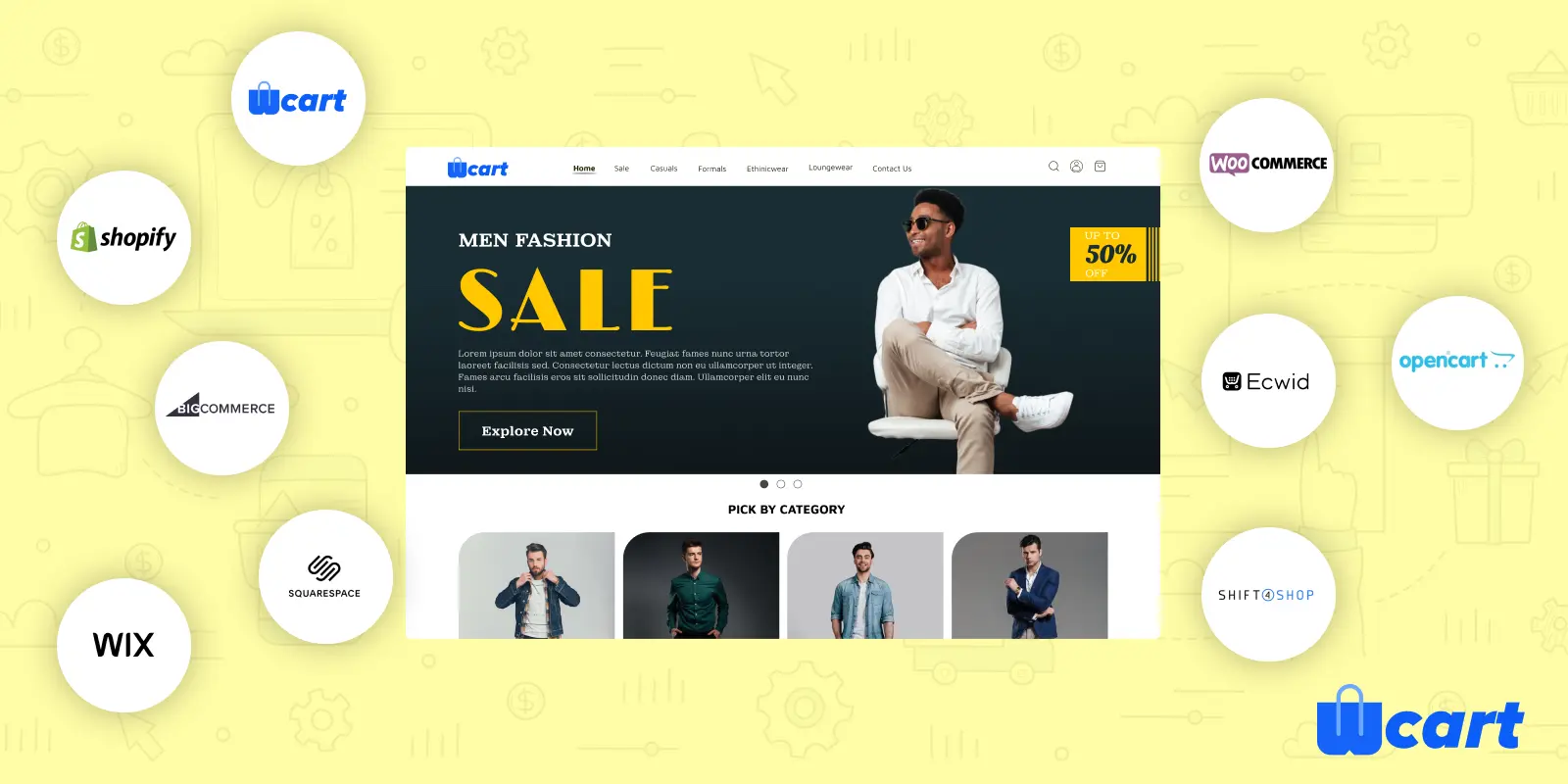



Leave a Reply